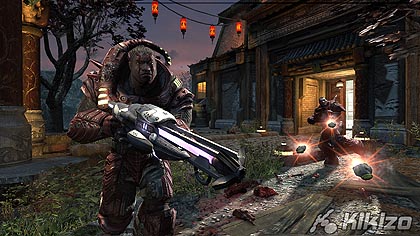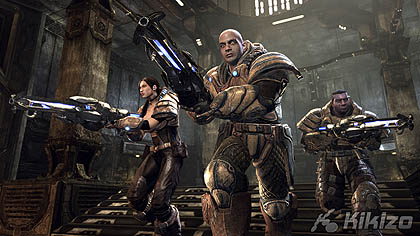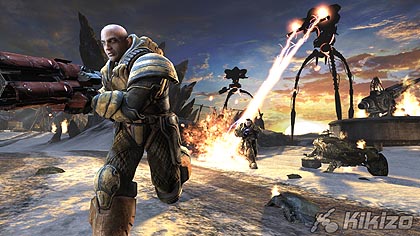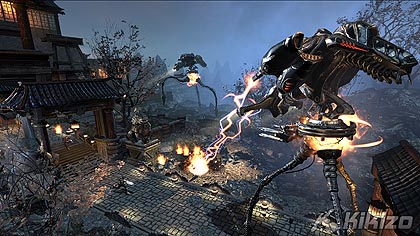Unreal Tournament 3: Mark Rein Interview
We quiz Epic Games bigwig Mark Rein on the all-new UT3, talk about the PS3 and Xbox 360 versions, and discover that Unreal Engine 3 IS actually in development for Wii.
Page 3
Kikizo: It was quite painful getting it to that level on the PS3 though, wasn't it, I mean Phil Harrison said he sent a few people out to Epic...
Rein: But so what, that's what console companies do, they do it for everybody. Those guys that came to visit us for a few days here and there, trust me, when they weren't at our office they were at EA's or Activision's, I mean that's what console manufacturers do, it's what Nvidia does and ATI does, what Intel and AMD do, that's what Microsoft does! That's what you do when you have a hardware platform like that - you help your customers make better games for that platform, there's nothing unusual there. Was it painful? No more painful than any other development project is. Making games is hard! It was hard for us to get the engine running so well on Xbox 360, and hard to get it running so well on low-end PC graphics cards. These are all the challenges of being in the game business and being in the technology business. So we're really happy with how it runs now on PS3.
Kikizo: Will the PS3 version run in 1080p?
Rein: So, with the engine, yeah, you could make Unreal Engine 3 content that runs in 1080p, no problem - in fact there are levels inside UT3 that will run at 1080p if there's nothing else going on in them. So if 1080p is your goal... you decide what your goals are when you're making a game. With Gears of War, a perfect example, one of our goals was this super rich experience with a really high level of detail in the graphics and to really push the bar up there. If our goal was 1080p, we couldn't have achieved that, just because it's all about the trade-offs. It's the same with UT; our goal is to have a really fast, smooth experience with all kinds of crap going on at the same time... people shooting you with rockets and explosions going on, you and ten bots running around like crazy... and if that's your experience and that's what you're trying to do, then you're a 720p game. So those are the decisions we make, because that's the kind of game we're trying to make, but if your goal is frame rate related, or if it's resolution related, you can just make trade-offs, you can have less stuff going on or code it differently, or simulate things. That's really just a game design decision. Now the engine does get better and better, as we move forward; so is it possible we one day do a UT style game on PS3 at 1080p? I guess so. Is it something we're likely to do? I don't know.
Kikizo: Warfare mode, that seems to be the big new thing, could you talk us through it a bit, and how do you think the competitive gaming community is going to embrace that?
Rein: I think it's really the showcase mode for the game - and singleplayer is actually a good explanation of Warfare mode if you don't know about it. Onslaught turned out to be the big mode when we looked online to see what people were playing, to the detriment of some of the other modes in fact. We definitely wanted to simplify the game and concentrate on making a really great super-fun, better AI, better game for the modes that were really popular, and leave the rest to the mod guys. And Assault was another mode that people really enjoyed. And so if you play through all the Warfare levels and the variations of them, you'll find that Warfare is a bunch of different things; some levels have some objectives to them that you have to complete, some levels are more just about more Onslaught style play, but that is definitely the mode that we thought was going to be key to the game. If you want to play something with a little more depth and strategy than just Deathmatch or CTF, then that's your mode. And it's great; we've had some amazing matches! And just on my own, I've had amazing matches with the bots - they're surprisingly good at playing it. And the one thing I really enjoy about Warfare is, when you're playing it against the bots, you know, if you put ten in they're all going to be pretty much the same skill level, which you've chosen, so they're going to balance each other out a little bit.
What I like about Instant Action is, I'm the difference. I will make the difference of winning or losing. Because the bots are going to fight each other, it's me giving the right orders at the right time, or leading the charge or staying back, that's going to make the difference to the outcome. And to me, that's pretty exciting, is to be able to play a game like that. Because when it's online, I have a very small contribute to the outcome of the game! Because so many people are so good, and they have their own strategies and their forming little cliques and they're doing this or the other. And sometimes I'm a defence or an attack guy or helping somebody with the flag, or carrying the orb. But when I'm playing with the bots, I'm the difference between and win and a loss, and that's pretty gratifying. To the other part of the question, I never know what the competitive gaming community is going to embrace; I mean that's always a big question mark! We just want to make a game that we love to play, and we're confident enough that if we love to play it, so will lots of people like us, and that's how we approach all game making, we're not targeting a game specifically for one audience or another, we're targeting it for us, and we're pretty broad in our thinking.
Kikizo: From what I understand, DirectX 10 is one of the few aspects that seems to be lacking in terms of what you've been doing with the UE work, is it something you're going to start to embrace?
Rein: Well yeah, we're really now - and when I say now I mean like a couple weeks ago when Nvidia shipped this 8800GT - we're finally at the tipping point for DirectX 10. If you make a really high end DirectX 10 aimed game, you're going to have a limited audience to. Now Crisis is not that game; it's also a really good DX9 game, so I'm not talking about any one particular game. And this is what amazes me, this happens only ten months after Vista has shipped, we have stable drivers now, we expected that to take even longer. We now have really good high-end hardware at mid-range prices, that the actual people who buy things can afford, with the 8800GT - we have a stable environment. So for me, now DX10 really matters, going forward. But today, as of the day we ship Unreal Tournament 3, the majority of people are still going to be playing on DX9, and on XP - even if they're got DX10 hardware they're probably using XP, so it wasn't a really important factor for the success of UT3, what was more important to us was making it run on DX8 hardware! And in some cases, on DX7 hardware - that was far more important to us, was making it run on the low-end hardware.
It's already a very good high-end experience, and there's not so much evolutionary stuff in DX10 that it would have ever made a significant visual difference to the game, because we still want to try and run on 7 and 8. But going forward now, and certainly in the games that we're going to start these days, it becomes an important factor, because next year, there'll be a huge... instead of the percentage of players on DX10 being this much, it'll be that much. And in two years it will be THAT much. The 8800GT is the card that really makes DX10 really matter to developers, and it's just started shipping. So it's going to take some time to get that out there. I am a huge fan of that card, because that's like, the money card for them! That's like... the CEO of Nvidia was explaining at the launch that every few generations, they hit this magic point where they can ship a high end technology at a mid range or low end price, and it's going to be really great for the PC games industry.
Unreal Tournament 3 is out tomorrow for PC, and will be out for PS3 in December in the US and next year in Europe.









 Satoru Iwata Video Interview - the late Nintendo president spoke with Kikizo in 2004 as 'Nintendo Revolution' loomed.
Satoru Iwata Video Interview - the late Nintendo president spoke with Kikizo in 2004 as 'Nintendo Revolution' loomed. Kaz Hirai Video Interview - the first of Kikizo's interviews with the man who went on to become global head of Sony.
Kaz Hirai Video Interview - the first of Kikizo's interviews with the man who went on to become global head of Sony. Ed Fries Video Interview - one of Xbox's founders discusses an epic journey from Excel to Xbox.
Ed Fries Video Interview - one of Xbox's founders discusses an epic journey from Excel to Xbox. Yu Suzuki, the Kikizo Interview - we spend time with one of gaming's most revered creators.
Yu Suzuki, the Kikizo Interview - we spend time with one of gaming's most revered creators. Tetris - The Making of an Icon: Alexey Pajitnov and Henk Rogers reveal the fascinating story behind Tetris
Tetris - The Making of an Icon: Alexey Pajitnov and Henk Rogers reveal the fascinating story behind Tetris Rare founders, Chris and Tim Stamper - their only interview? Genuinely 'rare' sit down with founders of the legendary studio.
Rare founders, Chris and Tim Stamper - their only interview? Genuinely 'rare' sit down with founders of the legendary studio. The History of First-Person Shooters - a retrospective, from Maze War to Modern Warfare
The History of First-Person Shooters - a retrospective, from Maze War to Modern Warfare